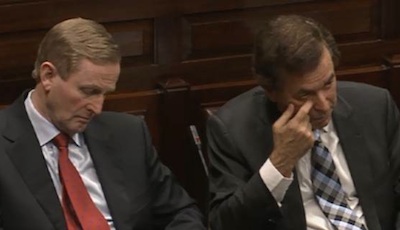
Continuing public anger over illegality, corruption and delinquency in the 26 County justice system has seen support for the Dublin coalition government slide to its lowest levels for several years.
Although Justice Minister Alan Shatter survived a confidence vote in the Dail this week, the two coalition parties, Fine Gael and Labour, now command the support of just 33% of voters. Sinn Fein’s support has remained relatively high at 21%, while Fianna Fail’s vote has increased to 25%, matching that of Fine Gael.
A series of revelations this week exposed further increased the scandal over the extensive illegal recording of phone calls by the state since the 1980s.
* The 26-County prison system authorities admitted they recorded up to four thousand conversations by prisoners over a four-year period. The phone calls, included ones by the prisoners to their lawyers, were recorded “inadvertently”, they said.
* In a single high-profile murder case, some 130 tapes of recorded conversations revealed extensive co-operation between the Gardai and mainstream media journalists as they sought to prepare (and possibly prejudice) the expected trial of Ian Bailey, who was twice arrested over the high-profile murder of wealthy French ‘socialite’ Sophie Toscan du Plantier in 1996. He is currently suing the 26-County state for false arrest.
* Gardai have been aware of illegally-recorded phone conversations with the two main witnesses in the du Plantier murder inquiry for over ten years, but long denied that such evidence existed.
* Garda figures sought approval from the 26-County Data Commissioner for the destruction of station tape recordings, without regard to their evidential value.
* The now ‘retired’ Garda Commissioner Martin Callinan said he chose not to tell Minister Shatter about the recordings issue last November, but only revealed the problem to the Attorney-General, Maire Whelan.
* An urgent communication from the Garda commissioner was not passed to the Minister for Justice by officials in the Department of Justice for over two weeks.
* Taoiseach Enda Kenny, who himself became aware of the judicial crisis only on March 23, said he did not consult with Minister Shatter on the issue for over 24 hours.
* On the day he faced a crucial no-confidence vote in the Dail, Minister Shatter claimed to receive a Nazi image and a threatening ‘white powder’, later identified as baking soda, by post. However, reports said the post had not yet been delivered in the area, and the Gardai, who were stationed outside, observed no alternative delivery.
Despite their appeals for ‘political unity’ from the opposition parties last month, no answers have yet been forthcoming from the government on any of the outstanding questions.
The controversy has taken its toll, however: Sinn Fein leader Gerry Adams is now the most popular politician in the state, while support for the coalition parties has fallen by six points.
Fianna Fail, who were in power when the illegal tape recordings began, saw their support jump and now again lay claim to be the most popular party in the state, alongside Fine Gael.
Although his own personal popularity fell sharply, Taoiseach Enda Kenny has insisted that the is unconcerned by the results of the new poll.
“We’re driving on with the double mandate given to us,” he said, “which was to sort out our finances and get our people back to work.”
In separate comments, a cabinet colleague of Mr Kenny admitted that the controversies surrounding the Department of Justice and the Gardai police had exposed the government’s failings.
With his Labour party is down one point to just 8% in this morning’s poll, Education Minister Ruairi Quinn also admitted that his government’s disastrous handling of the various garda scandals was behind their poor poll numbers.
“We haven’t had a great couple of weeks to be honest with you,” he said.
* Party support - when undecided voters are excluded - compared with the last similar poll is: Fine Gael, 25 per cent (down five points); Labour, 8 per cent (down one point); Fianna Fail, 25 per cent (up three points); Sinn Fein, 21 per cent (no change); and Independents and Others, 21 per cent (up three points).
![[Irish Republican News]](https://republican-news.org/graphics/title_gifs/rn.gif)
![[Irish Republican News]](https://republican-news.org/graphics/title_gifs/harp.gif)

